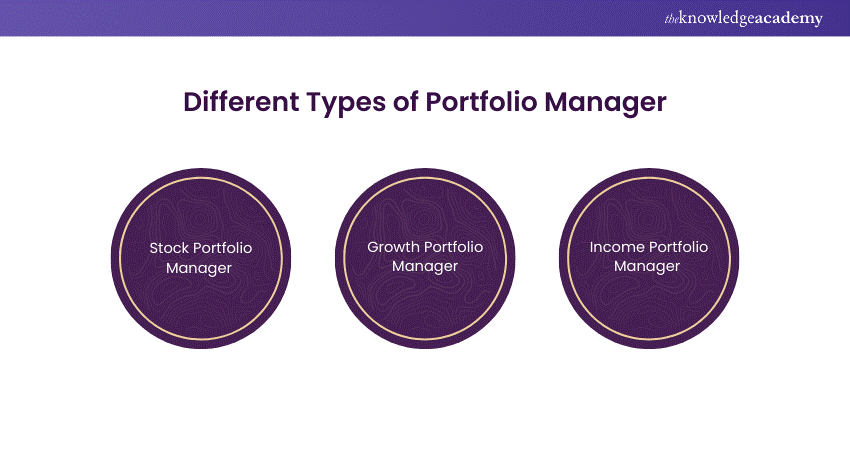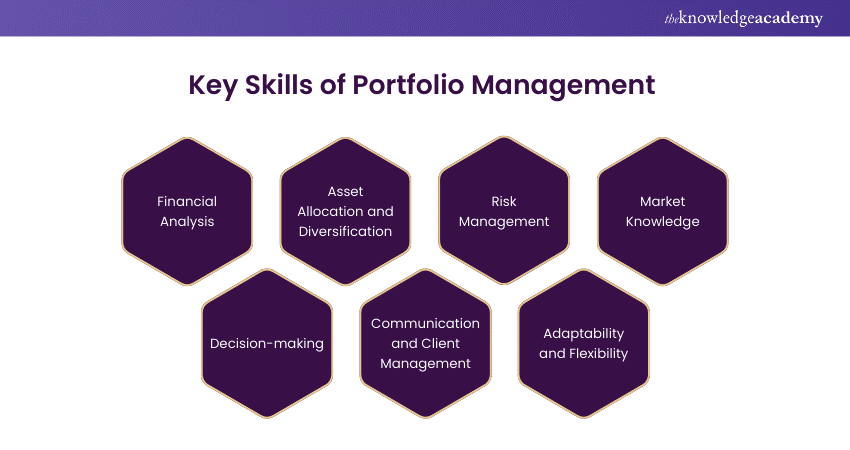We may not have the course you’re looking for. If you enquire or give us a call on +1 6474932992 and speak to our training experts, we may still be able to help with your training requirements.
Training Outcomes Within Your Budget!
We ensure quality, budget-alignment, and timely delivery by our expert instructors.

Learning What a Portfolio Manager is like a skilled chef who carefully selecting and combining different ingredients to create a diverse and appetising menu. Instead of food, however, a Portfolio Manager works with investments. They oversee a collection of investments, known as a portfolio, with the aim of achieving specific financial goals for their clients.
Similar to how a chef adjusts the proportions and combinations of ingredients to create a balanced meal, a Portfolio Manager adjusts the allocation and diversification of investments within a portfolio. By spreading investments across different asset classes and sectors, they aim to minimise risk and maximise potential returns. Read this blog further to answer your question ‘What is a Portfolio Manager’.
Table of Contents
1) What is a Portfolio Manager?
2) Where do Portfolio Managers work?
3) Different types of Portfolio Manager
4) How to become a Portfolio Manager?
5) Key skills of Portfolio Management
6) Difference between Portfolio Manager and Financial Advisor
7) Conclusion
What is a Portfolio Manager?
A Portfolio Manager refers to a financial professional, or even a registered company or person, whose task is to invest or place securities in a portfolio for an individual, institution, or fund. Generally, the manager undertakes all forms of asset allocation, security coordination, risk management, and performance without exceeding the set limits in an effort to achieve stipulated investment objectives. Specialised Portfolio Managers could be in charge of a specified asset class or investment strategy.
Where do Portfolio Managers Work?
Portfolio managers can work at various institutions: an investment banking firm, a private equity company, a venture capital firm, or a hedge fund organisation. In each of these environments, Portfolio Managers are equipped with market-trend analysis and expertise in weighing investment opportunities. This is followed by Strategic Management in order to optimise performance.
a) Investment Banking Firms
People who perform the role of a Portfolio Manager most often work for investment banks. Investment banks also assist individuals in raising capital, underwriting securities, facilitating mergers, and other forms of investment-related work. A significant part of what such large investment banks do includes the management of clients' investment portfolios. They will analyse the market trend, study possible options for investment, and come up with the right decisions to make the individual's investment portfolio perform best.
b) Private Equity Firms
Private equity firms invest only in private companies. Portfolio managers of the private equity company invest by purchasing equity shares in various privately owned businesses. Their investment managers research potential investments, analyse companies, structure deals, and direct and assist these companies in their development. Portfolio investment advisors aim to produce high returns for their investors by selecting attractive companies and actively managing their investments.
c) Venture Capital Companies
They can also work for venture capital companies that invest in early-stage or startup companies showing a high growth potential. Principally, the Portfolio Managers help source potential startups and conduct general market research and exploration of the viability and scalability of the business models.
They work closely with the portfolio companies in which they have invested and provide ongoing advice and support in taking challenges to ensure growth. Portfolio managers in venture capital companies are instrumental in the identification and growth of the next generation of successful businesses.
Learn the basics of Project Management, sign up for our Introduction To Project Management Certification Course - Register now!
d) Hedge Fund Organisations
These are pools of investment funds set up to collect from high-net-worth individuals and institutional investors. The hedge fund organisations have managers who are in charge of managing the fund's investment portfolios. The managers make substantial returns for their investors through standard employment of long and short positions on equities, derivatives, and leverage in the capital markets.
They also closely follow up on the market condition, run financial analyses, and, therefore, make timely investment decisions that take advantage of market opportunities in a bid to mitigate the risks involved.
Different Types of Portfolio Manager
Portfolio Managers of different types will have different approaches to constructing and managing portfolios that will suit different investment objectives. Understanding these differences helps the investor spot the Portfolio Manager who will be well-matched to a given set of objectives or a level of desire for a risk factor.

a) Stock Portfolio Manager
Stock Portfolio Managers have the expertise to manage marketable equity portfolios, mainly constituted by stocks. They understand the equity markets and gain insight, picking individual stocks that they feel are going to do better than the market. They really spend a good deal of time in research and make analyses to zero in on companies that have been based on good fundamentals and possibly have room for growth and competitive advantages.
They monitor market trends, companies' financials, industry developments, and other factors that might have a bearing on them when making investment decisions. They try building a diversified portfolio with the objective of achieving long-term capital appreciation.
b) Growth Portfolio Manager
A growth Portfolio Manager manages portfolios with the goal of capital appreciation and investing in growth-oriented assets. Oftentimes, they look for companies with a high growth potential and sometimes in new sectors or industries. Among the steps that come with investing, growth Portfolio Managers invest a lot of time researching companies with growing earnings potential and/or companies that have new and innovative products or services by which they can increase their market share. Continuous monitoring of the portfolio holdings is done, and position sizes are added to or reduced to reflect growth opportunities. The ultimate goal is to build large returns over the long term by owning shares in firms with the potential to grow much faster than average.
c) Income Portfolio Manager
An income Portfolio Manager focuses on managing portfolios whose primary objective is to generate a consistent stream of income for the investors. They select the investment that will provide regular income through dividends/interest, such as dividend stocks, fixed-interest corporate bonds, government and municipal bonds, REITs, or fixed-income securities.
All the same, income Portfolio Managers consider the credit quality, yield, and duration of assets generating income when building diversified portfolios that shall meet the income objectives and risk tolerance level of the clients. They technically handle the portfolio through efficient income generation while preserving capital and managing risks.
Gain expert insights and practical tools with our Portfolio Management Professional Course!
How to Become a Portfolio Manager?
Preparing to be a Portfolio Manager will take education, experience, and professional certification. Learn more about the steps involved in How to Become a Portfolio Manager:
1) Obtain a Relevant Educational Background: One would generally need at least a bachelor's degree in finance, economics, business, or related fields to qualify. Some firms might look for highly even further qualified professionals holding a master's degree in business administration or a chartered financial analyst.
2) Gain Experience in the Financial Industry: Entry-level positions in investment firms, banks, or other financial institutions will offer very pertinent experience and required exposure to the industry. One can start as an assistant investment manager, a financial analyst, or a research analyst to build the necessary background for investment analysis and Portfolio Management.
3) Develop Strong Analytical and Quantitative Skills: Portfolio managers need to possess excellent analytical skills to evaluate investment opportunities, analyse risk, and make informed decisions. Proficiency in financial modeling, data analysis, and statistical techniques is crucial for success in this field.
4) Obtain Relevant Certifications: Going after the professional certification will allow one to earn credibility and marketability. The most recognised certification for the Portfolio Manager is Chartered Financial Analyst (CFA). Other certifications could also be quite helpful for the Portfolio Manager, including those such as the Certified Financial Planner (CFP) or the Chartered Alternative Investment Analyst (CAIA), depending on the focus of the Portfolio Manager.
5) Build a Track Record of Successful Investing: Have something of a record in proving investment management of self-accounts and investment competitions, or, last but not least, have an internship or mentorship opportunity for practical experience.
6) Network and Seek Opportunities: Networking is fundamentally important to the way one advances in the financial field. To put it in easy terms, you will make good affiliations by attending trade shows, becoming members of professional bodies, and connecting with professionals who are already in the practice to discover potential opportunities.
7) Continual Learning and Staying Updated: The financial industry is evolving, and Portfolio Managers must stay updated with market trends, new investment strategies, and regulatory changes. Continuous learning through reading industry publications, attending seminars, and pursuing advanced education can help Portfolio Managers stay ahead in their field.
Starting of your journey as a Project Manager for small projects? Sign up for our Running Small Projects Course to guide you on your journey – Sign up now!
Key Skills of Portfolio Management
Successful Portfolio Managers possess a range of key Portfolio Management Skills that enable them to effectively manage investment portfolios. These skills include:

1) Financial Analysis: Portfolio managers must have strong financial analysis skills to evaluate financial health, performance, and valuation of potential investments. They analyse financial statements, assess risk factors, and make informed investment decisions depending on their analysis.
2) Asset Allocation and Diversification: Portfolio managers excel in ascertaining the optimal allocation of assets within a portfolio. They include factors such as risk tolerance, investment objectives, and market conditions to diversify investments across different asset classes, sectors, and geographies.
3) Risk Management: Portfolio managers have a deep understanding of risk management principles. They assess and mitigate risks through diversification, hedging strategies, and thorough due diligence. They monitor portfolio performance and adjust to manage risk exposure effectively.
4) Market Knowledge: Portfolio managers stay updated with market trends, economic indicators, and industry-specific knowledge. They analyse market conditions, identify emerging opportunities, and adjust investment strategies accordingly.
5) Decision-making: Strong decision-making skills are essential for Portfolio Managers. They must weigh various factors, evaluate investment options, and make informed choices in alignment with the portfolio's objectives and risk profile.
6) Communication and Client Management: Portfolio managers communicate complex investment concepts in a clear and brief manner to clients or investors. They establish and maintain strong relationships, understand client goals, and provide regular updates on portfolio performance.
7) Adaptability and Flexibility: Portfolio managers navigate changing market conditions and adapt their strategies accordingly. They are agile in responding to market fluctuations and adjusting portfolio allocations as needed.
Difference between Portfolio Manager and Financial Advisor
While both Portfolio Managers and financial advisors play crucial roles in investment management, there are distinct differences between the two:
1) Scope of Services: A Portfolio Manager has been found to primarily manage investment portfolios for clients and institutions. He analyses the market trends and selects investments to act upon in the maximisation of the portfolio return.
Financial advisors find means of giving clients personalised financial decisions and advice, which may also include portfolio management under the total package. Thus, financial advisors look at the wider aspects of clients' financial affairs, which include retirement planning, tax strategies, and risk.
2) Licensing and Regulations: Portfolio managers often have to get some related licenses, such as Series 65 or 66, which are monitored by a financial regulatory body. These are meant to give advice and manage the client's portfolio.
Similarly, a financial advisor might have those licenses but have more certifications, for example, holding the CFP mark, attesting to a level of experience in giving comprehensive financial planning.
3) Compensation Models: Usually, Portfolio Managers are paid on the basis of a fee. Here, the clients pay a certain percentage of their portfolio value as their management fee. Then come financial advisors who, apart from the fee charged for various advisory services, may also have the addition of commissions to the sale of various financial products. However, there could be variations in compensation models, and some financial advisors could also become fee-based.
4) Target Clientele: Portfolio managers typically work with high-net-worth individuals, institutional investors, or organisations that entrust them with managing substantial investment portfolios. Financial advisors, on the other hand, may work with a wider range of clients, including individuals with varying degrees of wealth and financial goals.
5) Investment Discretion: Portfolio managers often have discretionary authority over client portfolios, meaning they can make investment decisions without obtaining client consent for each transaction. Financial advisors, while providing recommendations and advice, typically require client approval before executing investment transactions.
Conclusion
We hope this blog answers your question ‘What is a Portfolio Manager’. They play a pivotal role in the financial industry, managing investment portfolios to meet clients' objectives. Whether in investment banking, private equity, venture capital, or hedge funds, their expertise in analysis, risk management, and strategic decision-making drives optimal returns. With diverse skills and adaptability, they ensure investors' financial success and growth.
Want to be an expert in Project Management? Sign up for our Portfolio Management Course - Register now!
Frequently Asked Questions

A Portfolio Manager oversees investment portfolios, analysing risks, selecting assets, and making decisions to achieve clients' financial goals. They diversify investments, monitor performance, and adapt strategies in dynamic markets to maximise returns for investors.

No, an MBA is not strictly required to become a Portfolio Manager. While it can be beneficial, gaining relevant experience, certifications like CFA, and strong analytical skills are often more critical for this role.

The Knowledge Academy takes global learning to new heights, offering over 30,000 online courses across 490+ locations in 220 countries. This expansive reach ensures accessibility and convenience for learners worldwide.
Alongside our diverse Online Course Catalogue, encompassing 17 major categories, we go the extra mile by providing a plethora of free educational Online Resources like News updates, Blogs, videos, webinars, and interview questions. Tailoring learning experiences further, professionals can maximise value with customisable Course Bundles of TKA.

The Knowledge Academy’s Knowledge Pass, a prepaid voucher, adds another layer of flexibility, allowing course bookings over a 12-month period. Join us on a journey where education knows no bounds.

The Knowledge Academy offers various PMP Training, including CAPM Certification Training, PMI-ACP, and PMP exam prep. These courses cater to different skill levels, providing comprehensive insights into Digital Project Management methodologies.
Our Project Management blogs covers a range of topics related to Project Management, offering valuable resources, best practices, and industry insights. Whether you are a beginner or looking to advance your Project Management skills, The Knowledge Academy's diverse courses and informative blogs have you covered.
Upcoming Project Management Resources Batches & Dates
Date
 PMI Scheduling Professional PMI-SP® Training
PMI Scheduling Professional PMI-SP® Training
Thu 1st Jan 1970







 Top Rated Course
Top Rated Course



 If you wish to make any changes to your course, please
If you wish to make any changes to your course, please


